|
WHEN you have found the
place where the shooting and fishing conditions are to your liking, a
permanent camp is the thing, and circumstances often render advisable
the building of a shelter more substantial and comfortable than the
fragile tents usually carried upon outing trips. Moreover, an ax, a saw
and a few pounds of nails are more convenient for transportation than
the tent itself, and abundant material for a log cabin can be found
convenient to any desirable camp spot in the woods. A log structure, no
matter how modest, will always be more comfortable than a tent, and in
cold weather there is no comparison whatever.
There are, however,
campers and campers, and for a certain class the tent will be found
advisable, for the reason that they will not be compelled twice to camp
in the same spot.
Some go into the woods
with a sublime indifference to dirt and litter of any kind. The floor of
the cabin is never swept, particles of food lie all about, cobwebs
everywhere, stove greasy, cooking utensils - faugh! There isn't a towel
about the place. The soap is covered with bark dust and straws, and
there is no arrangement for light at night. There are one or two
contrivances like sawbucks to sit on, and the bed is made of boughs an
inch thick, the stubby ends of which punch into you without mercy. There
are no pillows provided; you must fold up your coat or stuff your
bootleg and sleep as best you may.
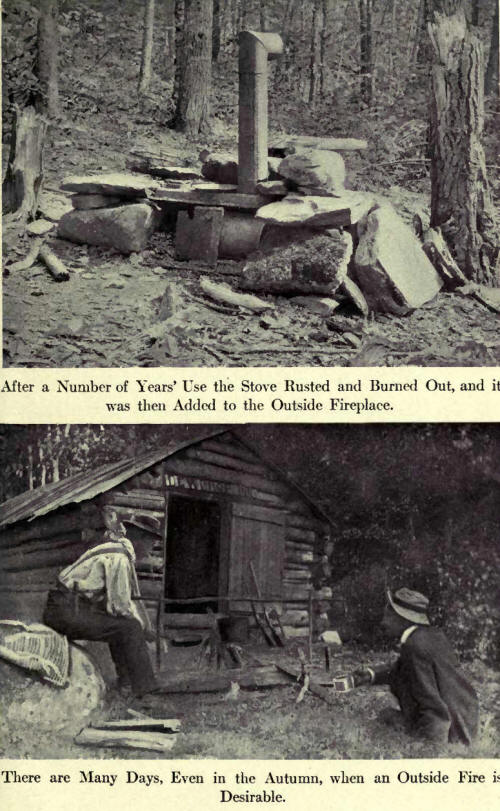
Outside the camp the same
conditions prevail. Fish heads and bones, deer's feet and pieces of
hide, tin cans and a slimy, odoriferous place by the door where all the
dishwater is thrown. With all my love for the out-door life and the
wildwood, I prefer my city studio.
These conditions are not
all brought about by the owners of wood camps, for in the nature of
things others will find them out and, according to the unwritten rule,
occupy them. Unfortunately not all who accept the hospitality of your
camp may be gentlemen, and it is to the rowdy class that we are largely
indebted for the conditions above mentioned.
The failing seems to be
universal. While hunting in the Rocky Mountains I came across a cabin,
erected possibly two years previously, which was practically wrecked
because some one was too lazy to cut the firewood which could have been
gathered within two rods of the camp. They chopped up the floor and
bunks and table instead.
Once during a severe
storm up in the Hudson Bay country we were forced to give up our hunt
for caribou and my guide started for a trapper's cabin which he knew to
be nearby. The storm continued for two days, and you may imagine that
our regards for the individuals who had occupied the camp before us were
outspoken when we found that every cooking utensil had been stuck up in
a conspicuous place and used as a target. They were so riddled with
bullet holes as to make them useless.
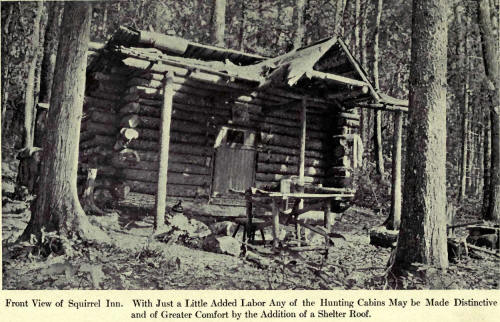
But for pure cussed
vandalism let me point you to the individuals from Ohio who, under the
guise of being sportsmen, struck the Maine woods north of Sebec Lake and
proceeded to take them apart. I will pass over their methods of hunting,
which, needless to say, was a highly successful slaughter, or their
methods of fishing, which were equally effective. A friend and I had
built a cosy cabin on a hillside, overlooking a gem of lakes in which
the trout could always be found. One month afterward we went back to
spend a few days, but the Ohioans had been there in the interval. They
needed a raft, so they tore down the logs from the camp, and with some
of the floor boards and the door managed to fashion a fine floating
platform from which to fish! What would you say?
Now, an open camp has
many objectionable features. It is cold, and to keep it warm requires an
extraordinary amount of firewood. During a storm the wind may haul down
an unexpected draw and pile the snow in upon you. In warmer weather they
are fairly comfortable, but the mosquitoes just dote upon that kind of
camp. True, a good smoke may keep them away, if you have luck and the
wind is right. But my experience is that a mosquito enjoying moderate
health can stand just as much smoke as I can. Then, of course, there
comes the time in the midst of the best sleep ever enjoyed when the
smoke apparatus goes out of business, and there is no longer any joy in
life.
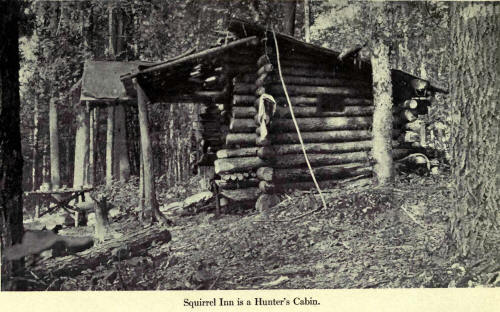
"Squirrel Inn" is a
little camp that has given shelter to many sportsmen. Its floor
dimensions are eight by ten feet. The peak is nine feet from the floor
and the rear wall five feet. This cabin was built with no other tools
than an ax and a saw. The great objection which I found with it was the
lack of light, due to the use of windows that were too small. The roof
was of birch bark, but this quickly became dilapidated and leaky. The
floor was made of poles flattened on the upper surface and with the
inequalities of the sides smoothed down. Two bunks, one above the other,
occupied one end of the camp. To make these, stout poles were set across
the cabin
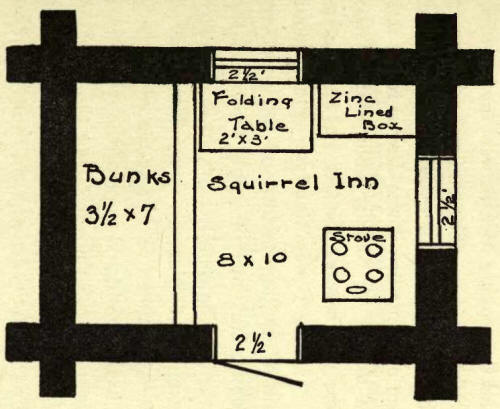
from wall to wall and on
them burlap was stretched. Balsam twigs were then shingled on top of
this. The box seat in the corner was lined with tin, and here matches,
flour, candles, etc., were kept. A small stove occupied the remaining
corner and the cooking utensils were hung on the walls behind it. The
roof extending over the front made an excellent shade from sun or rain
when it was desired to eat out of doors. A folding table occupied the
rear wall between the box seat and bunks.
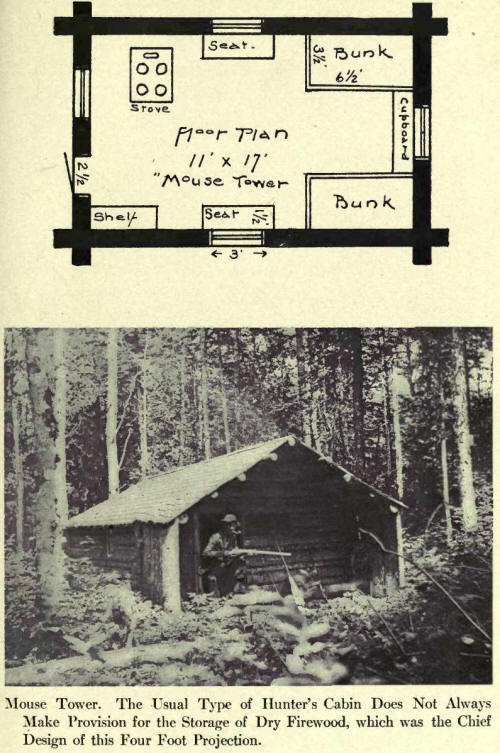
"Mouse Tower" is a type
of the general run of hunting cabins, and the directions for its
building will apply to any of the others. The completed cabin is eleven
by seventeen feet on the floor. Nine feet at the peak and five feet at
the eaves gives you the height and slope of the roof, which extends some
four feet over the front of the camp. The first course of logs is laid
directly on the ground and then leveled by knocking away the high places
with the poll of the ax and building up the low ones with rocks well
bedded. You have brought the window sash all set up, so there now
remains only the door to build. This should have been figured on
beforehand, so that it might be brought into the woods all cut to size,
ready to nail together. The handle and catch may be made as shown in the
drawing. Don't build a fireplace; have a stove and be comfortable. It
doesn't look as well, but for the practical purposes of heating and
cooking it is the thing. Set this as shown in the plan, leaving
sufficient space for firewood between it and the cabin walls.
Don't build your bunks
one above the other unless circumstances require it. Let the mosquitoes
have a chance to get away from you if they want to; besides, fresh air
is very desirable. The bunks shown will accommodate four ordinary men
comfortably, and should be built about eighteen inches above the floor,
with a guard board around the top about four inches high. If you are in
a region where balsam boughs may be obtained, cut a sufficient quantity
of the little ends, which are about five inches long, and proceed to
make your bed by shingling them in place at a slight angle, with the
sharp or stick end down. This is a long operation, but once done it will
last a long time and be fairly comfortable. The aroma of the pine,
however, will be its chiefest charm, for no matter where one goes
camping he carries with him the lingering memory of spring beds and
mattresses, and their comfort is real and tangible.
The shelf near the door
is convenient when cooking and during the inevitable dish-washing
operation. The utility of the folding seats will be recognized by every
one, particularly the practical joker.
Gun rack, coat hooks,
etc., may be made of crotched sticks cut and fastened to the wall as
shown.
In the warm weather the
heat of the stove is intolerable, so that a fireplace should be
constructed in front of the cabin

on which to do the
cooking. Make it of stones, built up as shown in the illustration, and
place over it a pole quite high, from which wires can be hung on which
to suspend the kettles.
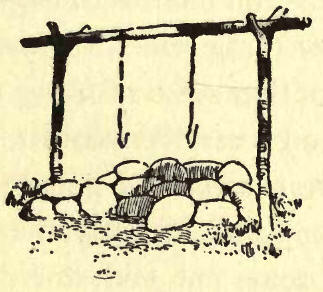
Outside the cabin set two
posts in the ground about eight feet apart, leaving about eighteen
inches project. Cut a sapling of sufficient length and fasten securely
to the two logs, and you have a fine footrest in the summer evenings
after the day's fishing, when the campfire is lighted and the stories
and pipes are going.
You will find that
several yards of mosquito netting will not be amiss when properly
distributed over the door and windows, and if you will take a couple of
hours for cleaning house on entering camp for the season you will be
more than repaid by the absence of insects and spiders.
When the fall months
come, with a mantle of snow flung wide over the landscape and the
hunting season for big game is on, you will find it very convenient,
after a day in the forest, to have a goodly supply of firewood on hand.
So, if you are wise, you will have some cut and stored under the
protecting eaves of the front of the cabin before leaving in the summer.
Hang a board in a
conspicuous place, or bring a sign with you to tack on the door which
will read:
WELCOME
TO ANY BROTHER SPORTSMAN
PLEASE LEAVE THE CAMP IN AS
GOOD CONDITION AS YOU FIND IT
AND
PUT OUT THE FIRE
Thus the ethics of the
woods may be taught to the ignorant, and the thoughtless be reminded.
In arranging the interior
of these cabins one thing above all else should be looked after, the
comfort of the occupants. With Nessmuk, "I go into the woods, not to
rough it, but to smooth it." That, my friend, is what you, too, must do
if any benefit to health or peace to soul is to be derived from your
recreation.
Now, in the hunter's
cabin there is every opportunity for being comfortable. This means that
some furniture should be made; but not so much that there will be no
room
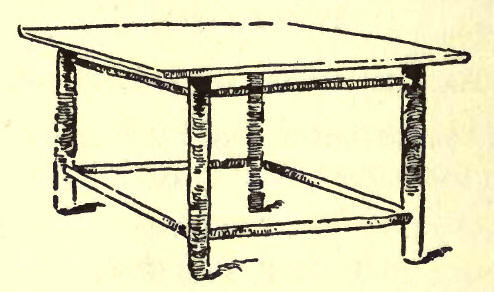
for the would-be
occupants. Draperies seem out of place in a camp of this kind, but a
substitute can be found in the various animal skins procurable.
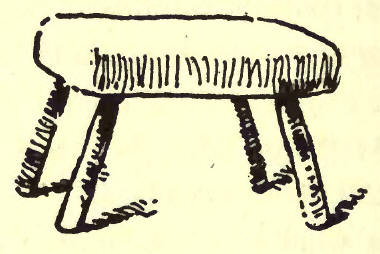
There are a number of
fine sporting pictures to be had which can be framed with ordinary white
pine strips four or five inches wide, on which birch bark has been
glued. These, properly hung on the wall, will do much toward enlivening
and beautifying the interior.
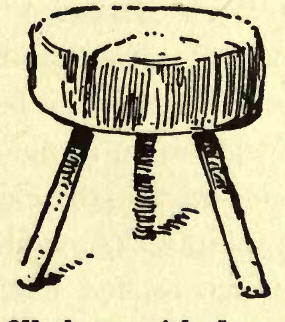
As cushions for the
window seats, make sacks of some stout material—burlap is good—and fill
them with dry moss or balsam twigs and then cover the whole with skins.
Tables and chairs are
easily constructed, as shown in the drawings.
Dispose of your guns,
rods and paddles in such places as will have the best decorative effect,
and after putting up a bookshelf (old magazines are absolutely new on
rainy days) add whatever seems necessary in the way of pipe racks,
tobacco boxes, etc. Make a towel rack and provide a place for the soap.
Then fill some large sacks of heavy muslin or denim with very dry moss
and soft evergreen twigs for pillows. Devote some space to a good map of
your locality, properly mounted on cardboard so that it may not be
easily torn. A kerosene lamp is an abomination. The wick is soon used
up, the chimney easily broken, the thing reeks of oil and is altogether
a source of too much attention. Candles are much better, though slightly
more bulky.
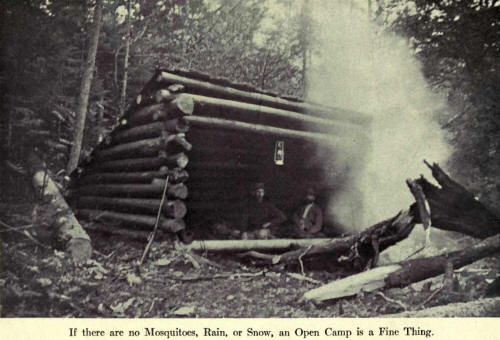
If you are in a big game
country, arrange a beam nearby the camp on which to suspend such game as
may be brought in. If you have ever tried to raise a good-sized buck
into place you may remember that it involved something of an effort. A
big blacktail is harder to arrange, a caribou almost impossible, and a
moose is the limit. The solution is easy. On one of your trips pack in
some small blocks and tackle, and be sure to have your beam strongly
braced and secure. Fashion a number of gambrels or sticks for spreading
the carcasses. These are merely hardwood sticks eighteen inches or
longer. Larger ones should be made for lifting the animals. Have a place
for these where they may be found when wanted.
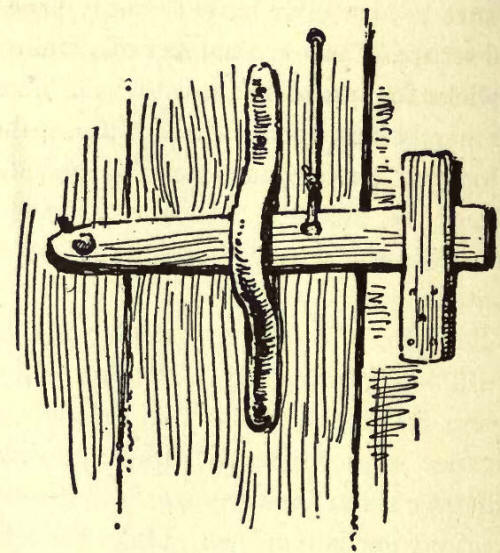
The door will need a
fastening and, as it will swing inward, the fastening will of course be
on the inside. A simple contrivance is shown in the drawing, which will
serve better than any words to describe exactly what is required. Make
the latch of hard wood, and if no other means are at hand to bore the
hole on which it swings, burn it through with some convenient piece of
iron. Attach a cord or thong to the latch, let it pass up above the
latch for a foot or so and then through a hole in the door, whence it
can hang down ready for use. A small stick tied to the end will prevent
the latchstring from inadvertently getting pulled inside the cabin.
Dig a hole into which the
litter from the camp may be thrown and covered with a thin layer of
earth. This will aid materially in keeping down the number of
houseflies.
The earth should be
banked about the camp to keep the water from running underneath, and to
shut out the draughts during the colder seasons. |

